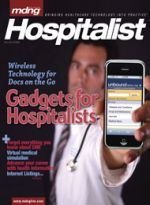Publication
Article
So You Wanna... Be a Podcaster?
OncNG spoke with Monte Ladner, MD, producer and host of the Fitness Rocks series of podcasts to learn what it takes to a be a physician podcaster. What makes podcasting appealing...
OncNG spoke with Monte Ladner, MD, producer and host of the Fitness Rocks series of podcasts, to learn what it takes to a be a physician podcaster. What makes podcasting appealing to physicians?
Many patients are anxious, have a lot on their minds, and are afraid to ask questions when speaking with their physicians, who are themselves often extremely busy. This can hinder effective communication and contribute to poor information recall and treatment adherence. But what if the important condition-specific information and instructions from those conversations were recorded on a podcast that patients could access on demand? Podcasts are also incredibly powerful tools for training physicians, including medical students, residents in training, or practicing physicians who may be taking CME.
Say you’re an anesthesiology resident in your first year of residency, and you finish your day in the operating room and discover you’re scheduled to do a carotid endarterectomy early the next morning; you’ve never done that and have no idea about the case, how you’ll do the anesthetic, what preoperative evaluation of the patient entails, etc. How are you going to get as much information as possible in a short period of time?
You could go home and read the relevant chapters in an anesthesiology text—if you can stay awake long enough—or you could go to your department’s website and download the carotid endarterectomy podcast, which has a series of entries with experts in the field taking you through preoperative evaluation, complications you can expect, the different and best ways to approach anesthetic management, and postoperative complications. Listening to a conversation between experts on how they’d approach a particular medical situation is much easier than trying to find the essential material in a textbook.
What are the first steps to producing a series of podcasts?
You need equipment with which to record yourself, which can be done inexpensively. Most computers come with built-in microphones and recording software. There are also several simple handheld digital recorders available for about $100. Of course, you can spend lots of money—I have a professional-grade recording studio, with mixers, pre-amps, and stuff that I really don’t even understand how to use, but it gives me high-quality sound. You’ll also need to transfer your recordings to the Internet. Most of the blogging websites, for example www.blogger.com and http://wordpress.com, provide the ability to upload audio files. I use a service called LibSyn, which is simple to use. You save the recording on your computer, go to the LibSyn website, enter your password, and upload your file. You can also set up an account that enables you to offer your audio files for download on other sites (such as iTunes).
What time commitment is needed to produce a podcast? Do you have any recommendations on how physicians can balance doing so with their everyday practice?
It depends on the quality you want, in terms of recording, editing, and content. I spend an enormous amount of time with my podcasts, because I research every one. I read several medical journal articles and select two or three to review. I also write the transcript before I do the podcast, which means that I’ve essentially written a magazine article on the topic. I also do a high-quality recording and then use editing software so that I don’t sound like an idiot.
An average practicing physician who’s working 70-80 hours a week is probably not going to want to take on that level of commitment. On the flip side, you can also just get a handheld recorder and record your thoughts during the day. If you are going to do a podcast that is intended to supplement conversation with patients, you must invest enough time to make sure the information is accurate and well referenced. The upside is that you’re going to get a return on the time you invest, because it’s going to expedite your ability to communicate with patients down the road. You might have spend a day or two getting it done right, but then you can use it over and over until the information needs to be updated.
What advice would you give to a physician who is considering becoming a podcaster?
Listen to several podcasts, and ask yourself “What can I provide that’s not already being done?” or “If it is being done, how can I do it better?” Secondly, create something akin to a business plan. What are you going to talk about, and is your topic broad enough to sustain itself for the long run? There’s nothing wrong with doing a finite series of podcasts if you have a specific area of interest you want to talk about. In that case, you might want to work with some physician colleagues who can talk about other topics. A group practice could produce a series of podcasts to which all of the physicians contribute by recording an occasional podcast. In addition to conveying useful information to patients, this is also a terrific marketing tool, because you’re providing content to people who can benefit from it and impress them with how bright and intelligent the doctors are in your group.






